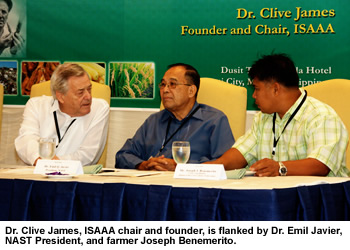
Philippines Remains at the Forefront of Biotech Adoption in Asia
March 5, 2010| |
 The Philippines remains to be in the forefront of GM/biotech corn adoption in the Asian region being the only country in Asia to grow GM/biotech food. In 2009, the area planted to genetically modified corn is projected to increase to about 490,000, from 11,000 hectares of Bt corn when it was first planted in 2003. This is based on the projection data shared by the International Service for the Acquisition of Agri-biotech Applications (ISAAA) during the recent Seminar of its Chair and Founder, Dr. Clive James, on the Global Overview of Biotech/GM Crop: 2009 - Current Status, Impact and Future Prospect, The event participated by the academe, scientists, regulators, policy makers, technology developers and farmers was co-organized by the National Academy of Science and Technology (NAST), the SEAMEO Southeast Asian Regional Center for Graduate Study and Research in Agriculture (SEAMEO SEARCA), and the International Service for the Acquisition of Agri-biotech Applications (ISAAA).
The Philippines remains to be in the forefront of GM/biotech corn adoption in the Asian region being the only country in Asia to grow GM/biotech food. In 2009, the area planted to genetically modified corn is projected to increase to about 490,000, from 11,000 hectares of Bt corn when it was first planted in 2003. This is based on the projection data shared by the International Service for the Acquisition of Agri-biotech Applications (ISAAA) during the recent Seminar of its Chair and Founder, Dr. Clive James, on the Global Overview of Biotech/GM Crop: 2009 - Current Status, Impact and Future Prospect, The event participated by the academe, scientists, regulators, policy makers, technology developers and farmers was co-organized by the National Academy of Science and Technology (NAST), the SEAMEO Southeast Asian Regional Center for Graduate Study and Research in Agriculture (SEAMEO SEARCA), and the International Service for the Acquisition of Agri-biotech Applications (ISAAA). In the forum, Mr. Joseph Benemerito, a recipient of the National Best Quality Corn Farmer in 2008 from Alfonso Lista, Ifugao, shared his experience in planting insect resistant, herbicide tolerant and stacked trait corn. His corn harvest increased from 3 to 3.5 metric tons per hectare from conventional corn to 7 to 8 metric tons per hectare from biotech corn. National Scientist Gelia T. Castillo in her message also posed challenges for scientists, plant breeders and economists to help in the development of a science culture in the Philippines that will serve as the foundation for strategic actions to alleviate poverty and hunger in the country.
To date, the Philippines has 49 approvals for the direct use /importation of biotech crops for food, feed and processing for crops such as corn, alfalfa, sugarbeet, soybean, potato and squash. Five events have been approved for commercial propagation.
For details on the Seminar, contact Jenny Panopio, SEARCA BIC network coordinator at jap@agri.searca.org.
| |
Biotech Updates is a weekly newsletter of ISAAA, a not-for-profit organization. It is distributed for free to over 22,000 subscribers worldwide to inform them about the key developments in biosciences, especially in biotechnology. Your support will help us in our mission to feed the world with knowledge. You can help by donating as little as $10.
-
See more articles:
-
News from Around the World
- Biotechnologies Should Benefit Poor Farmers in Poor Countries
- New Project to Identify Best Approaches to Improve Agriculture in Developing Countries
- African Small Stakeholders Get Assistance from Germany
- First Commercial Planting of SmartStaxTM Corn Hybrid
- Corn and Soybean with New Herbicide Tolerance Traits
- Potato with Dual Resistance to Fungal Diseases
- ABSTC Reports IRM Stable Compliance and Requirements
- Discovery in Legumes to Reduce Fertilizer Use, Aid Environment
- Canada Invests in Oil Seed Research
- Peru to Prohibit Importation of GM Seeds
- Philippines Remains at the Forefront of Biotech Adoption in Asia
- Royal Society of New Zealand on the Potential Benefits and Risks of GM Forages
- European Commission Approves Amflora Starch Potato
- EU-JRC Publishes 9 New Plant Summary Notifications
- Oviposition Behavior of Pest Insects Keeps Bt Cotton Durably Resistant
- Commission Announces Proposal for GM Planting Choice for Member States
- PRRI-STOA Seminar for EU Parliamentarian on GMOs
- BIO Welcomes EU Decision on Biotech Crops
-
Research Highlights
- Researchers Examine Plant's Ability to Identify and Block Invading Bacteria
- Green Energy from Pea
- Researchers Develop Model to Predict Pollen-Mediated Gene Flow in Rice
- Teaching Corn to Fix Its Own Nitrogen
-
Announcements
- TWAS Fellowships
- Sustainability through Agricultural Biotech: Food, Biomaterials, Energy and Environment
-
Read the latest: - Biotech Updates (February 18, 2026)
- Gene Editing Supplement (January 28, 2026)
- Gene Drive Supplement (February 22, 2023)
-
Subscribe to BU: - Share
- Tweet
